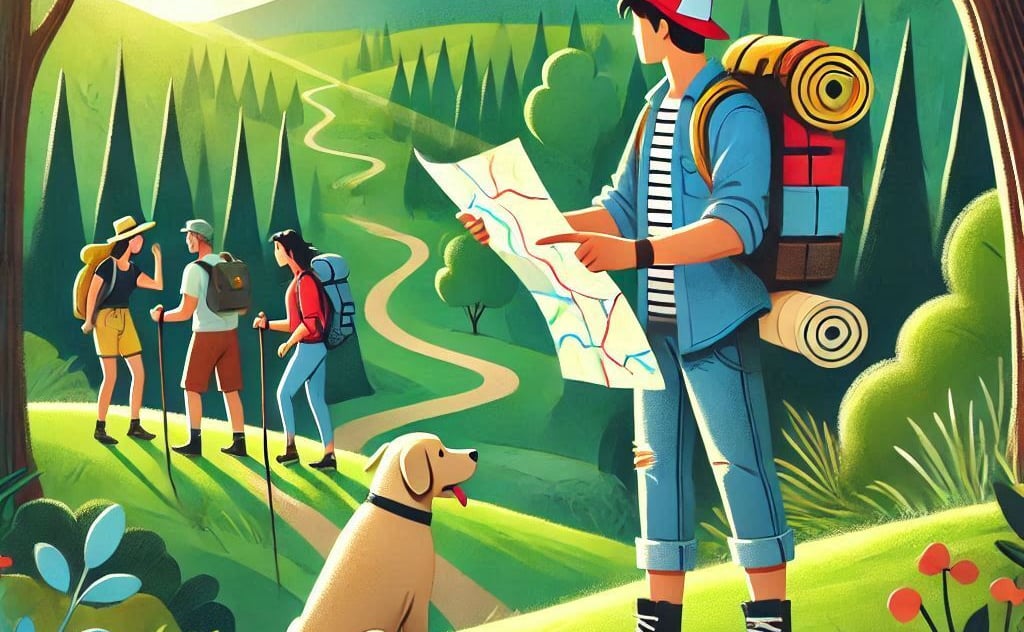What to Do If You Get Lost While Traveling: A Comprehensive Guide
Discover essential tips on what to do if you get lost while traveling. From staying calm and using technology to asking for help and retracing your steps, this guide equips you with practical strategies to navigate unfamiliar places and ensure a safe, enjoyable adventure. Never let getting lost ruin your journey!
The Traveled for You Team
12/16/20246 min read


What to Do If You Get Lost While Traveling: A Comprehensive Guide
Getting lost while traveling is probably one of the most upsetting situations to be in. You might have strayed off a trodden path in some big city or taken the wrong turn in the countryside-the feeling of uncertainty tends to be overwhelming. But not to worry! In this post, we look at practical steps one can take if they get lost while traveling and recover one's bearings to ensure the continuation of the adventure in safety.
1. Stay Calm
Firstly, what one should do, if he or she happens to understand that he or she got lost, is not panic at all. It blocks one's mind and makes the situation just worse. Take a few deep breaths to center yourself, allowing your mind a little time to focus. You need to remember that even most travelers get lost; that is temporary. You will be able to rethink the situation with a clear mind and patience. A positive attitude will keep you going and ensure that your thoughts are logical and effective while trying to solve the situation.
2. Assess Your Situation
As you have relaxed, keenly observe your environment. You will ask yourself the following questions:
Where am I? Look for landmarks, street signs, or anything familiar in sight.
How did I get here? If possible try and track back your steps so as to assemble how you got there.
What resources am I presented with? Check your phone whether its battery, data connection, or access to offline maps.
Use Technology to Your Advantage
These days, your phone can be a real lifeline. With internet access, use apps such as Google Maps or Citymapper to lead you back to your origin or some other known point. When service isn't available, it's a good idea to already have maps pre-downloaded as a backup that you know you can depend on.
By keeping calm, assessing one's options, and using technology appropriately, it is possible to regain your bearings and get safely on your way.
3. Ask for Help
If you feel lost, never hesitate to ask for assistance from natives since they sometimes may know some useful ways of getting to a place effectively. Here are a few suggestions as to how to approach them:
Select the Right Person: Find friendly-looking people; examples include shopkeepers, families, or anybody that would appear willing to help you.
Be Polite: A decent attitude goes a long way. Begin the conversation with a polite phrase, such as, "Excuse me, could you help me?"
Bring Visuals: Carry a map or a screenshot of your destination to make it easier for the person to understand where you want to go.
By following these steps, you will realize that people are often happy to assist, making your journey smoother and more enjoyable.
4. Familiarize Yourself with Local Emergency Numbers
Being prepared in case of emergencies is part of travel. That includes knowing the country's specific emergency contact numbers, since they differ from nation to nation. Sure, the world over recognizes 911, but other nations use a different number to reach police, fire services, or medical help. Before your trip, research and save these numbers on your phone and write them down in your travel journal for added security. In high-pressure situations, easy access to these numbers means precious time saved and swift assistance. It is also recommended to take some time out and learn how the mechanism of emergency services works in the destination, as some countries might need further assistance, like detailing the location in their native language. Knowledge and preparedness play a great role in navigating unfortunate events. Knowing how to act fast in an emergency can help reassure you and carry you safely through your journey.
5. Retrace Your Steps
If you do not feel vulnerable, you can try backtracking.
First, look for landmarks or buildings you recognize to help you go back to where you were before. This will give you some confidence in your surrounding environment. One of the practical methods of getting your bearing is going back to where you know. If you remember passing a landmark that you can easily remember, you head back to where it is for reference.
Paying attention to how many steps you have taken may also help you remember the path you have taken before you became lost. Many times, you will be able to reconnect with familiar areas and find your way back by carefully retracing your movements.
6. Use Landmarks to Navigate
Landmarks will simplify finding your sense of direction. How to do it:
Watch out for tall buildings or any monuments that are well-known around the area. Use them for guidance and head towards them.
Use natural features like rivers, mountains, or parks for orientation. Since they can be seen from far away, they are pretty distinctive to navigate with.
You can orient yourself by observing these distinctive landmarks and find your way around, even in new surroundings.
7. Stay Where You Are if Necessary
If you're in a place that's unfamiliar and starting to feel unsafe, the rule of thumb is to always remain in one spot-especially if it starts getting dark or the place is deserted. You are most apt to be found when you stay in one spot.
Get to a safe space where you are surrounded by people-for example, a busy café or a shop. Such places offer refuge and, sometimes, staff who could assist you.
If you are in a public place, wave for help or approach people who look trustworthy, like store employees or other bystanders, for help. Drawing attention to yourself may be just what you need to get help.
8. Prepare for Future Trips
Avoiding getting lost during future travels requires thoughtful preparation. Here are practical tips to enhance your safety and confidence while exploring:
Always Have a Backup Plan
Preparation is key. Before heading out, familiarize yourself with the area:
Download Offline Maps: Use apps like Google Maps or Maps.me to download maps for access without internet.
Carry a Physical Map: Technology can fail, so having a reliable paper map ensures you’re never without guidance.
Keep Essential Information Accessible
Always maintain a list of critical contacts and details, including:
Accommodation Information: Write down your hotel name, address, and phone number in case you need directions.
Local Emergency Numbers: Save these on your phone and on paper for added security.
Use a Watch
Wearing a watch helps you stay mindful of the time, preventing you from wandering too far or losing track of your schedule.
Putting all these strategies together will help you confidently move around in an unfamiliar place and minimize the chances of getting lost for a safe and pleasant journey.
9. Engage with Locals and Other Travelers
The best moments of travel often come from connecting with others. When you have been lost or needed an extra bit of guidance, locals or fellow travelers often gave support and companionship where you needed it.
You're gonna find that doing some tours of the local sights is gonna be a great way for you to immerse into this place and meet others. Apart from sightseeing, these tours will give you the opportunity to mingle with other curious people; shared experiences spark meaningful conversations and friendships.
Another great option for making friends is to stay in hostels. Most travelers love to stay in hostels since it is cheaper and makes for great company. They have lots of group activities, and thus it is never a problem to find others, share your travel experiences, and plan further voyages together.
Whether it be through tours, hostels, or just asking for help, there are unlimited possibilities to make good contacts during your travels.
10. Keep a Positive Attitude
Be positive; getting lost ushers one into very unexpected yet memorable adventures. Travel open-minded, and you just may stumble upon something better that you would have missed otherwise.
And, of course, never forget to take pictures any time you see something catchy or beautiful. Such a moment can be remembered forever-just be prepared for these captures, and the story about your journey will be kept with you.
Getting lost is also an excellent opportunity to come across new people. Whether it is talking to locals for unique insights or other travelers with the same sense of adventure, it could add value to your experience. It could be a simple conversation that leads to tips that are very valuable, a new friendship, or even fascinating places to explore.
Detours can make for great travel memories, keeping your curiosity alive and open to possibilities.
Conclusion
Losing one's way while traveling can be a gut-wrenching feeling, but it doesn't need to ruin your trip. You can find your way again by not panicking, assessing your situation, and using the resources around you. Remember, in the future, be better prepared, stay positive, and expect the unexpected. After all, some of the best stories come from adventures that didn't go as planned.
Inspiring travel stories and practical tips await you.
Wanderlust
Adventure
contact@traveledforyou.com
© 2024. All rights reserved.
